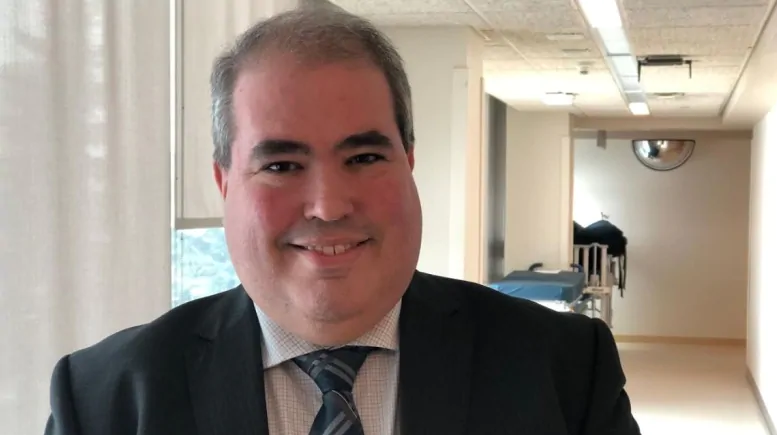Lab technician packaging a specimen to be sent to Public Health Ontario for COVID-19 testing. Photo credit: Michael Garron Hospital
There is growing recognition that we are now facing a pandemic with COVID-19. For this reason, infection prevention and control (IPAC) leaders in Ontario hospitals recently called for a move from local containment to broader planning in managing the incidence of COVID-19 in the province.
The potential spread of COVID-19 comes at a time when many hospitals are already dealing with significant capacity pressures that have been exacerbated by the annual the flu season. For a system already straining to meet heightened demand for care due to a growing and aging population, preparing for the spread of COVID-19 is essential.
In a recent Globe and Mail article, Dr. Janine McCready, an infectious diseases physician at Michael Garron Hospital (MGH) in Toronto, reinforced the need to enhance planning efforts as soon as possible and said that hospitals are doing what they can to prepare. MGH has recently shared some of the ways it is preparing for COVID-19, putting elements of its pandemic plan in place that include education and simulations, working with partners, screening, monitoring key supplies and potential COVID-19 testing.
 Dr. Jerome Leis, Medical Director for Infection Prevention and Control at Sunnybrook says hospitals are more prepared because of the lessons we’ve learned. (Hospital News) Dr. Jerome Leis, Medical Director for Infection Prevention and Control at Sunnybrook says hospitals are more prepared because of the lessons we’ve learned. (Hospital News) | Another key example is when the first COVID-19 case in Toronto appeared at Sunnybrook Health Sciences Centre's (Sunnybrook) emergency department on January 23 (a traveler with fever, respiratory symptoms, and a recent travel history to Wuhan, China). As Dr. Jerome Leis, Medical Director for IPAC at Sunnybrook explained in a recent Hospital News article, necessary precautions were immediately undertaken by the health care team - such as immediate islation of the patient - to ensure the safety of all patients and staff. Two days later, the diagnosis was confirmed by the Public Health Lab in Ontario. According to Dr. Leis, preparedness efforts at the hospital began long before COVID-19 appeared based on lessons-learned during the SARS outbreak and other epidemics since. Similarly, at Kingston Health Sciences Centre (KHSC), COVID-19 preparedness was already underway in early January, and kicked into high gear with the repatriation of Canadians to nearby CFB Trenton and KHSC's designation as the tertiary care centre for those patients. |
It was an early opportunity to nail down infection control precautions, processes and pathways for receiving persons under investigation or quarantined for COVID-19. As we move from the containment to mitigation phase of COVID-19 planning, the task of creating safe, specific clinical workflows has expanded across key clinical and support services to ensure that KHSC has the appropriate procedures, equipment and beds in place to identify, follow and manage patients with suspected or confirmed COVID-19.
"Our experiences in the past with SARS in 2003, pandemic H1N1 in 2009 and Ebola in 2012 have told us to plan early and anticipate escalation if and when that should occur," says Dr. Gerald Evans, Medical Director, KHSC Infection Prevention & Control, and Chair of the Division of Infectious Diseases, Queen's University. "This has helped enormously in informing our COVID-19 efforts over the last two months since learning of this new viral pathogen in late December 2019."
Hospitals outside of the urban core are also doing what they can to prepare for COVID-19. Domonic Giroux recently told the CBC that Health Sciences North (HSN) is ready should the novel coronaviros emerge in northern Ontario. Listen to Mr. Giroux's studio interview here. Hospital-based surveillance under IPAC leadership will continue to be critical to reducing transmission of COVID-19 within health care facilities. These measures are required to keep health care workers and hospital patients safe, and to prevent overwhelming the health system's capacity to care for all other patients who require hospitalization. Echoing Sunnybrook's experience, Humber River Hospital CEO, Barb Collins, says that Canada is much more prepared now than it was for SARS in terms of analysis and standardized practices with respect to protecting health care workers and patients. | 
Health Sciences North president and CEO, Dominic Giroux, is confident in the steps that have been taken to prepare the hospital for COVID-19. (Markus Schwabe/CBC) |
Recently, Ontario's hospitals and their IPAC leads advocated for a number of important priorities to strengthen the province's pandemic planning efforts. For example, with additional funding, hospital laboratories can contribute to enhanced surveillance and screening of patients based on the evolving case definition. Moreover, IPAC leads like Dr. McCready have said that sentinel surveillance needs to begin immediately. This involves testing a large number of people presenting at hospitals "with unexplained severe respiratory illness, or those who test negative for the flu" in order to help verify if and when COVID-19 begins to spread in Canada.
Infectious disease specialist Dr. Michael Gardam, who is Chief of Staff at Humber River Hospital and Medical Director for IPAC at Women's College Hospital, agreed with Dr. McCready in a recent CBC article that Canada will need to expand testing, moving from just screening travelers to testing people without a travel history who meet these criteria – as was the case in California that was announced on February 26.
IPAC leads have also recommended employing sound decision-making based on clinical evidence around the epidemiology of COVID – for example, changing current recommendations for managing patients with suspected or confirmed COVID-19 to droplet/contact precautions and limiting airborne precautions to aerosol-generating medical procedures.
As the global situation continues to evolve on a daily basis, Ontario's hospitals remain vigilant as they work to ensure that protocols and practices are in place, and new ones prepared for future implementation. As previously highlighted, locally, Ontario hospitals are taking important steps to enhance Ontario's response and preparation efforts with respect to COVID-19.
Watch the CBC Video below: Dr. Michael Gardam says outbreak still in early stages.